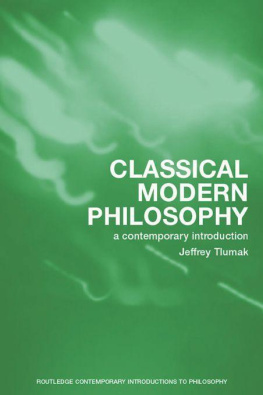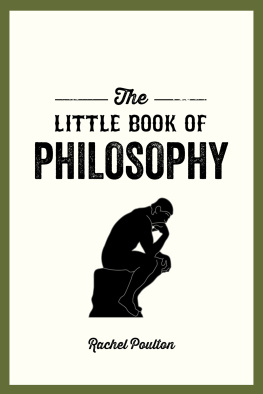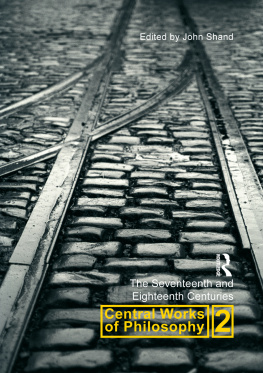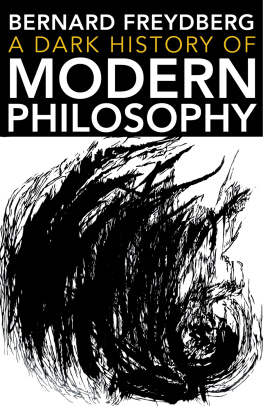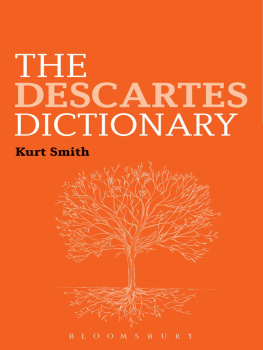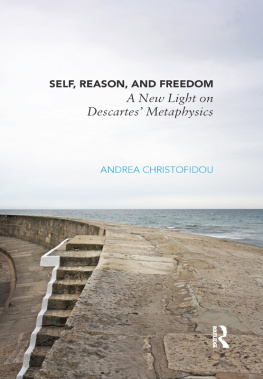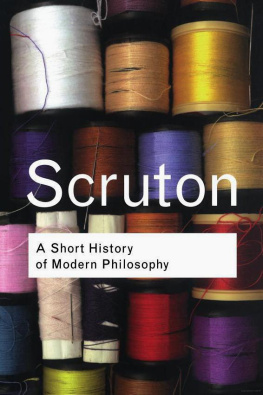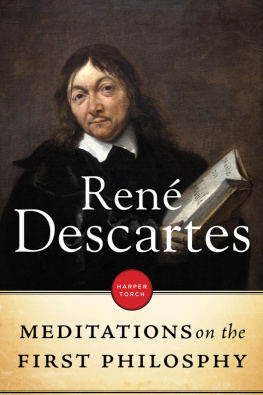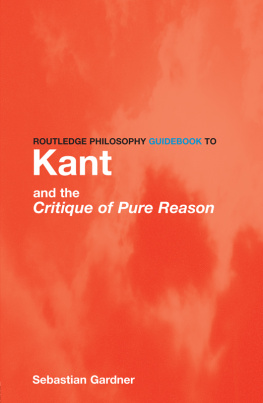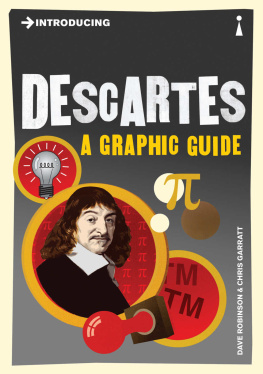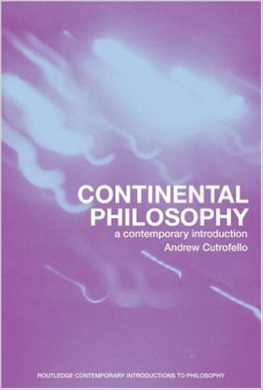Classical Modern Philosophy
Classical Modern Philosophy introduces students to the key philosophers of the seventeenth and eighteenth centuries, and explores their most important works. Jeffrey Tlumak takes the reader on a chronological journey from Descartes to Kant, tracing the themes that run through the period and their interrelations. The main texts covered are:
Descartes Meditations on First Philosophy
Spinozas Ethics
Lockes An Essay Concerning Human Understanding
Leibnizs Discourse on Metaphysics and Monadology
Berkeleys A Treatise Concerning the Principles of Human Knowledge and Three Dialogues between Hylas and Philonous
Humes An Enquiry Concerning Human Understanding, A Treatise of Human Nature and Dialogues Concerning Natural Religion
Kants Critique of Pure Reason, Groundwork of the Metaphysics of Morals
Classical Modern Philosophy: A Contemporary Introduction is the ideal textbook to accompany a course in the history of modern philosophy, but each chapter can also be studied alone as an introduction to the featured philosopher or work. Jeffrey Tlumak outlines and assesses prominent interpretations of the texts, and surveys the legacy of each great thinker.
Jeffrey Tlumak is Associate Professor of Philosophy at Vanderbilt University.
Routledge Contemporary Introductions to Philosophy
Series Editor:
Paul K. Moser
Loyola University of Chicago
This innovative, well-structured series is for students who have already done an introductory course in philosophy. Each book introduces a core general subject in contemporary philosophy and offers students an accessible but substantial transition from introductory to higher-level college work in that subject. The series is accessible to non-specialists and each book clearly motivates and expounds the problems and positions introduced. An orientating chapter briefly introduces its topic and reminds readers of any crucial material they need to have retained from a typical introductory course. Considerable attention is given to explaining the central philosophical problems of a subject and the main competing solutions and arguments for those solutions. The primary aim is to educate students in the main problems, positions and arguments of contemporary philosophy rather than to convince students of a single position.
Classical Philosophy
Christopher Shields
Epistemology, Second Edition
Robert Audi
Ethics
Harry Gensler
Metaphysics, Third Edition
Michael J. Loux
Philosophy of Art
Nol Carroll
Philosophy of Language
William G. Lycan
Philosopy of Mind, Second Edition
John Heil
Philosophy of Religion
Keith E. Yandell
Philosophy of Science, Second Edition
Alex Rosenberg
Social and Political Philosophy
John Christman
Philosophy of Psychology
Jos Luis Bermudez
Continental Philosophy
Andrew Cutrofello
Classical Modern Philosophy
Jeffrey Tlumak
Classical Modern Philosophy
A contemporary introduction
Jeffrey Tlumak

First published 2007
by Routledge
2 Park Square, Milton Park, Abingdon, Oxon OX14 4RN
Simultaneously published in the USA and Canada
by Routledge
270 Madison Ave, New York, NY 10016
Routledge is an imprint of the Taylor & Francis Group, an informa business
2007 Jeffrey Tlumak
Typeset in Garamond and Gill Sans by Taylor & Francis Books
Printed and bound in Great Britain by TJ International Ltd, Padstow, Cornwall
All rights reserved. No part of this book may be reprinted or reproduced or utilised in any form or by any electronic, mechanical, or other means, now known or hereafter invented, including photocopying and recording, or in any information storage or retrieval system, without permission in writing from the publishers.
British Library Cataloguing in Publication Data
A catalogue record for this book is available from the British Library
Library of Congress Cataloging in Publication Data
A catalog record for this book has been requested
| ISBN10:0-415-27592-X | ISBN13:978-0-415-27592-7 (hbk) |
| ISBN10:0-415-27593-8 | ISBN13:978-0-415-27593-4 (pbk) |
| ISBN10:0-203-64242-2 | ISBN13:978-0-203-64242-9 (ebk) |
To my splendid daughter, Jennifer
My touchstone for what counts most
With my love and admiration
Contents
Preface
This is a guide through the systems of the seven brilliant seventeenth- and eighteenth-century European philosophers most regularly taught in college Modern Philosophy courses. I have taught Modern Philosophy at Vanderbilt University twenty-seven times, never quite the same way twice. I have taught graduate seminars on individual Moderns twenty-three times (as well as tutorials on more focused student concerns twenty-two on Kant alone), also never mimicking an earlier outing. This is not because I am a glutton for gratuitously hard work, but because every time I restudy the magnificent contributions of these thinkers I see still more which convinces me that they are even better than I had judged, and so I both enthusiastically want and feel obliged to convey my improved understanding and evaluation. No doubt this means that I will believe I could represent these systems still more elegantly and forcibly by the time you read this. But we should not let the perfect be the enemy of the good, and I do think you will enjoy an unusually up-to-date, sympathetic appreciation of these great minds in the incarnation of my efforts now before you.
I struggled with overall format, and concluded I could serve you best by treating with special care the masterworks of each philosopher studied most often, and using that treatment as the skeleton around which all enrichments from other sources should be organized. I can assure you that even if you are not reading some selected masterwork, taking my journey will help you grapple with your text. The pivotal texts I will explore and interrelate are Descartes Meditations on First Philosophy, Spinozas Ethics, Lockes An Essay Concerning Human Understanding, Leibnizs Discourse on Metaphysics and Monadology, Berkeleys A Treatise Concerning the Principles of Human Knowledge and Three Dialogues between Hylas and Philonous, Humes An Enquiry Concerning Human Understanding, A Treatise of Human Nature, and Dialogues Concerning Natural Religion, and Kants Critique of Pure Reason and Groundwork of the Metaphysics of Morals.
I aim to give you well-informed guidance. I will do so by combining my own readings of these ingenious efforts with fair representations of serious, alternative interpretations. Since Modern Philosophy courses tend to concentrate on metaphysics, the study of the nature and structure of reality, and epistemology, the study of the nature, scope, and limits of knowledge and justified belief, I will highlight those concerns, but will also put those concerns in systematic context. Finally, because of their extraordinary influence on subsequent philosophy and especially prominent role in contemporary , a summary of Cartesian commitments which set the agenda for subsequent defenders and critics.
Acknowledgments
I thank the many fine students who have allowed me the joy to reread and rethink the masterpieces of modern philosophy. Among my graduate students, these include Paul Moser, Andy Cling, Daryl Hale, Tim McGrew, Dan Silber, John Lysaker, Jeff Tiel, Derek Turner, Brian Ribeiro, Tommy Crocker, Scott Aikin, James Bednar, Steve Hammontree, Toni Nicoletti, Diane Williamson, and my first, wonderful supervisee and friend, the late Scott Shuger. Among my own teachers, special thanks to Fred Feldman, who influenced me most; thanks also to Bruce Aune, Vere Chappell, Gareth Matthews, Robert Sleigh, Robert Paul Wolff, and the late Roderick Chisholm. Among my own graduate student classmates, fondest memories of Michael Hooker, who remained my closest friend until his untimely death. Gregg Horowitz and Rob Talisse embody what one seeks and admires in departmental colleagues; I appreciate their enriching friendship. Among those in the profession with whom I am not intimate, the most impactful on this book have been Robert Adams, Henry Allison, Annette Baier and Barry Stroud. Of course many others have informed and motivated me as well, including an anonymous referee who commented on my near-completed manuscript for Routledge. Finally, I most deeply appreciate my daughters, Jennifer and Zena, who have bolstered immeasurably the abiding sense of stability and meaningful commitment that frames lifes various challenges and opportunities.
Next page
